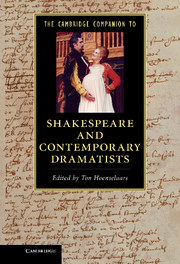Book contents
- Frontmatter
- Contents
- Illustrations
- Contributors
- Preface
- Chronology of the life and work of Shakespeare and contemporary dramatists
- 1 John Lyly and the University Wits
- 2 Thomas Kyd and the Elizabethan blockbuster
- 3 ‘The words of Mercury’
- 4 The dyer’s hand
- 5 Urbane John Marston
- 6 Thomas Dekker and the emergence of city comedy
- 7 Shakespeare
- 8 Thomas Heywood
- 9 George Chapman’s learned drama
- 10 Francis Beaumont and John Fletcher’s tragicomedy as musical melodrama
- 11 Thomas Middleton and the early modern theatre
- 12 John Webster
- 13 John Ford
- 14 Philip Massinger
- 15 Richard Brome and the idea of a Caroline theatre
- 16 Troublesome histories
- Select bibliography
- Index
- References
13 - John Ford
Suffering and silence in Perkin Warbeck and ’Tis Pity She’s a Whore
Published online by Cambridge University Press: 05 December 2012
- Frontmatter
- Contents
- Illustrations
- Contributors
- Preface
- Chronology of the life and work of Shakespeare and contemporary dramatists
- 1 John Lyly and the University Wits
- 2 Thomas Kyd and the Elizabethan blockbuster
- 3 ‘The words of Mercury’
- 4 The dyer’s hand
- 5 Urbane John Marston
- 6 Thomas Dekker and the emergence of city comedy
- 7 Shakespeare
- 8 Thomas Heywood
- 9 George Chapman’s learned drama
- 10 Francis Beaumont and John Fletcher’s tragicomedy as musical melodrama
- 11 Thomas Middleton and the early modern theatre
- 12 John Webster
- 13 John Ford
- 14 Philip Massinger
- 15 Richard Brome and the idea of a Caroline theatre
- 16 Troublesome histories
- Select bibliography
- Index
- References
Summary
Almost every aspect of the life and career of John Ford (1586–c. 1637) presents us with a puzzle. We can be confident that he was the second son of Thomas Ford of Ilsington in Devon and his wife Elizabeth Popham, who was the niece of Sir John Popham, the Lord Chief Justice, and was related through her mother to the important South Welsh family of Stradling. One of the many important trials over which Popham presided was that of Sir Walter Raleigh, which Ford mentions in The Golden Mean, and the Stradling family included, among other interesting members, the Sir John Stradling who translated Justus Lipsius’ De Constantia, whose Stoic outlook is very much in tune with Ford’s own work. However, the name John Ford is such a common one (the dramatist shared it with at least one of his own cousins, John Ford of Gray’s Inn, to whom he dedicated his play Love’s Sacrifice) that we can never hope for absolute certainty when dealing with any of the later aspects of his career, and even when we can feel reasonably confident that we are dealing with the right man, the story tends to present oddities. The dramatist is probably the John Ford who attended Exeter College, Oxford, and went from there to the Middle Temple; however, he was never called to the bar, and his principal occupation and the source of his income remain a mystery, which is intensified by the fact that after the publication of his last known play, The Lady’s Trial, in 1639 he disappears without trace.
The course of his writing career is no clearer than that of his adult life. In 1606, at the age of twenty, he published a poem, Fame’s Memorial, mourning the death of Charles Blount, Earl of Devonshire, and a prose piece, Honour Triumphant, associated with the chivalric entertainments provided in connection with the visit of Christian IV of Denmark, brother-in-law of James I. Ford is also now usually accepted as the author of another elegy, on the Devon-born William Peter, which appeared in 1612; this was briefly and controversially attributed to Shakespeare, but the question of its authorship seems to have been settled by the publication of Brian Vickers’s exhaustive study ‘Counterfeiting’ Shakespeare.
- Type
- Chapter
- Information
- Publisher: Cambridge University PressPrint publication year: 2012

